#Sir Arthur Conan Doyle Center
Text
TRM Round 1: Night at the Museum (Rexy) vs. The Lost World (1925)

Night at the Museum (Rexy) – Based on the real T. rex fossil at the American Museum of Natural History, Rexy proves to be far more animated than night security guard Larry Daley had expected. Fortunately, Rexy is more fun-loving than dangerous and is happy to play fetch with one of his own ribs.

The Lost World (1925) – Based on the novel of the same name by Sir Arthur Conan Doyle, The Lost World centers around…well, a lost world where non-avian dinosaurs still exist. As one would expect, a crew of explorers decide to go there and get themselves into peril. A Tyrannosaurus is among the many dinosaurs and other prehistoric creatures featured in the film, and it’s seen fighting with a Pteranodon, a Brachiosaurus, and a dubious ceratopsian.
#t. rex madness#t. rex#tyrannosaurus#tyrannosaurus rex#dinosaur#dinosaurs#night at the museum#the lost world
45 notes
·
View notes
Text
Favorite Villains of Classic English Literature
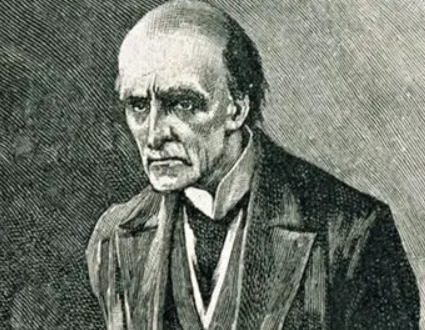
Professor Moriarty - This villain is pure, beautiful simplicity: he's an alternate version of the hero with the morality removed. Both Holmes and Moriarty are quirky loners with genius IQs that thrive on challenging their intellects via loaning it out to others in some form of service. But Holmes has a conscience, a sense of right and wrong, which is why his service is that of a consulting detective, whereas Moriarty is a total sociopath whose service is that of a consulting criminal, meaning that he has an invisible hand in almost every crime that's carried out in London. Sir Arthur Conan Doyle gives an absolutely perfect description of him and how he operates as a villain: "He is the Napoleon of crime. He is the organizer of half that is evil and of nearly all that is undetected in this great city. He is a genius, a philosopher, an abstract thinker. He has a brain of the first order. He sits motionless, like a spider in the center of its web, but that web has a thousand radiations, and he knows well every quiver of each of them. He does little himself. He only plans. But his agents are numerous and splendidly organized. Is there a crime to be done, a paper to be abstracted, we will say, a house to be rifled, a man to be removed--the word is passed to the Professor, the matter is organized and carried out. The agent may be caught. In that case money is found for his bail or his defense. But the central power which uses the agent is never caught--never so much as suspected."
Favorite adaptations: Professor Moriarty (Ernest Torrence) in Sherlock Holmes (Fox, 1932), Professor Moriarty (Lionel Atwill) in Sherlock Holmes and the Secret Weapon (Universal, 1943), Professor Moriarty (Eric Porter) in Sherlock Holmes (Granada, 1984), Professor Ratigan (Vincent Price) in The Great Mouse Detective (Disney, 1986), Jim Moriarty (Andrew Scott) in Sherlock (BBC, 2010), Jamie Moriarty (Natalie Dormer) in Elementary (CBS, 2012), and William "Liam" James Moriarty (Soma Saito) in Moriarty the Patriot (Shueisha, 2016).

Captain Hook - If Professor Moriarty is a great complex presentation of a simple character, then Captain Hook is the opposite: a complex character who is presented simply. A ruthless pirate captain with a limb replaced by the object he derives his name from is the easiest thing in the world to understand, but there's much more to old James beneath that surface: a well-educated English gentleman depressed with the notion that he's squandered his life away but too far gone in his pride to turn back, constantly striving for "good form" even when his occupation doesn't allow for much of it, and obsessed with getting revenge on Peter Pan partly out of jealousy and partly to distract from the inevitability of the end result of what Pan did to him - namely, an ever-pursuing crocodile that will ultimately mark the end of his life when the clock it swallowed finally stops ticking. If Pan shows the problems with never growing up, then Hook shows the problems with losing your innocence when you grow up. For as over the top of a villainous character as he is, he's also a tragic, even relatable one.
Favorite adaptations: Captain Hook (Ernest Torrence) in Peter Pan (Paramount, 1924), Captain Hook (Hans Conreid) in Peter Pan (Disney, 1953), Captain Hook (Cyril Ritchard) in Peter Pan (Broadway, 1954), Captain Hook (Tim Curry) in Peter Pan and the Pirates (Fox, 1990), Captain Hook (Dustin Hoffman) in Hook (Amblin, 1991), Captain Hook (Jason Isaacs) in Peter Pan (Universal, 2003), "Jimmy" (Rhys Ifans) in Neverland (Syfy, 2011), Killian Jones (Colin O'Donoghue) in Once Upon a Time (ABC, 2012), Captain Hook (Stan Tucci) in Peter and Wendy (ITV, 2015) and Captain Hook (Jude Law) in Peter and Wendy (Disney, 2023).
And hey, wouldn't you know it! The same actor got the ball rolling in my favorite adaptations of both these characters! Clearly, the two of them were always destined to share this post.

26 notes
·
View notes
Text
Concise Guide to Developing a Neuroscience Based BBC Sherlock Holmes Esq Mind Palace
Following is a condensed and concise guide for you to develop similar sorts of mental mastery as Sherlock displays in the amazing British interpretation of Sir Conan Arthur Doyle's beloved character. I use this mind map everyday for basically everything and I don't think that there is any area of my life that hasn't been improved in someway by engaging with its mechanics.
This mindmap was designed to be useful in almost all life circumstances and there is a great deal of flexibility and modifications that can be made to its use to be tailored to your own particular needs to maximize utility and functionality
The key to this system is that there are six main inputs of which all you have to do is think of one of the six directions in orthogonal Euclidean space. I chose each direction in correlation to the general theme of the cognitive heuristic that you want to "activate" with the general function of the region of (the majority) of peoples brain has somewhat localized centers dedicated to said cognitive pattern.
The labelling of these directions is arbitrary and feel free to define your own characterization or order of inputs however I just listed my ontology as is I use it IRL.
+z/-z -> 1, 2 (or forward/back) respectively
-x/+x -> 3, 4 (or left/right) respectively
-y/+y 5, 6 -> (pr down/up) respectively
It is key to keep in mind of your mind that -z is essentially just the direction that your eyes face as set in your skull for a point of reference.
Below is a table summarizing these inputs along with a brief description of each directions psychological and cognitive theme
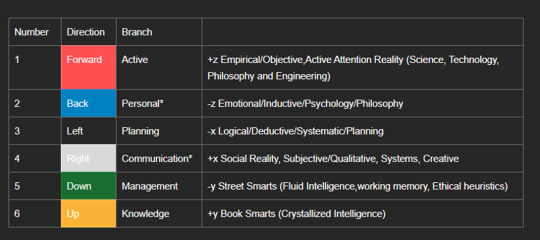
Each "direction" can be further broken down by applying the six inputs again which results in six main branches and thirty six sub branches, the initial thematic aspect behind the choice of the first six inputs are extrapolated and carried through into the assignment of the sub set of the thirty six sub branches so there is a degree of logical organization of the resultant four dimensional meta cognitive structure (four dimensions as inputs will be repeatedly done temporally as needed)

The mental representation of the MM will look like the image above with the caveat that in all Euclidean directions, there would be an addition MR unit facing out of each plane which would be 1, 1/2, 2/3,3/4,4/5,5/6,6 respectively. Also inputs that "bounce back" such as 1, 2/2,1 3,4/4,3 and so on are considered to be unique inputs as its the pathing and tracing out of these inputs mentally which acts non-combinatory to result in a total of thirty six unique sub branches.
There may be a lot of unfamiliar terminology, especially acronyms which I have developed just mostly for my own use before I decided to put this memeplex out into cyberphysical reality, if there are any terms or concepts that anyone is unsure about feel free to ask but I am going to define everything in Unsignificant Sentience eventually.
Key to understanding and using this list is that each integer corresponds to one pole of a base Euclidean axis
One: active
1 1 Sense, Attention and Action (Non-selective/Selective and/or Undirected/Directed Attention), AAPM (Active Attentional Perception Model)
1 2 Perceiving, Observing, and Introspection, SVD
1 3 Logic, MM Model Axioms and Experimentation, ISR, EGC Outcomes
1 4 Assessment Describing, +y/MR/ME EIOSA Modelling
1 5 CBT, BH, Working Memory
1 6 Specific Thinking, Frame Encoding, and MEs Applications and Management (Inter branch/Sub Branch)
In your minds eye the pathing thought trace input should result in something like this.

Two: personal
2 1 All Current Recursive Conscious Perception (EIOSA Analysis/Awareness)
2 2 Narrative, Identity Management, Frames, Auxiliary SA/EMA, Qualia
2 3 R4, ME, (in vivo UJF Functionality/Integration)
2 4 Beliefs, Values, Hopes, Ethics, Dreams (+DRD4 content)
2 5 Memory, Mnemonics, AE Encoding and Recall
2 6 Consciousness + VSM/UJS Models, Influencers (5 x) and CT Management CTx PPF, PQ

I will only fill out one more guide for the inputs for the Third Branch as it should be pretty easy to extrapolate the pattern by this point
Three: planning, logic, and structure
3 1 Dynamic Planning and Situational Awareness, (ME0002)
3 2 Skills and Technical Application/Adaption/Singular Module: Heuristic Focus
3 3 Active Goals and Projects/Schedule, Mnemonics
3 4 Habits/Predispositions/Routines/Baselines (SETS, Blooms Taxonomy) and limitations, Re (self-imposed and/or Real Boundaries), Frames and Physiological/Psychological Patterns
3 5 Resource Management
3 6 Ideas or Future Goals and Projects/Personal Engineering, USF, CMM, NWF

Four: Systems, Creative, and Communication
4 1 Agent Based, Observance and Interaction with Systems Associated and Context Awareness, ToM EIOSA
4 2 Persona and Ego Management
4 3 Reality, Social and Communication, Systems Identification/Interaction/Alteration/Mechanisms Options, Sets/OMA7, Objective EI IRL Network Corresponding to Meta Frameworks
4 4 MR/ME Grids + Practice/Enactment In Vivo
4 5 Communication and Sapir Whorf Language Management, Social Analysis and Responses
4 6 Ontology and Frame Engineering, Perspective Theory
Five: health
5 1 Physical Health (ER AnE + Diet/Hydration/Sleep/Medication)
5 2 Mental Health (ME0005/ME0010 Checks and Reconciliation)
5 3 Self Management and Contingencies
5 4 State of Other Systems, EISOA x, x,, (MR of Self Same) (States in Regards to Meta-Systems)
5 5 Applied Mindful Meditation, Self Awareness (Recursivity), and Reality Checking, PQ
5 6 Cognitive Health (DRD4 quality + CIA quality)
Six: knowledge
6 1 Technology
6 2 Philosophy
6 3 Engineering
6 4 General/Cultural
6 5 Frameworks
6 6 Science
Viable System Model based MM systems
The viable system model is a cybernetic theory and model utilized to model entities so that they remain viable and resilient in the fact of change. The model itself was derived from the physiological evo psych based compartmentation of function present in the human brain. I am going to do a post on VSMs at some point but the Wikipedia link is there if anyone is interested.
Below is a rough guide to what MM outputs correlate to each system in a viable system model
System One: 1 x , 3 3, 3 5, 6 x
System Two 2 1-3
System Three 3 1-3
System Four 4 x, 5 x, 6 x
System Five 2 4-6, 3 4-6
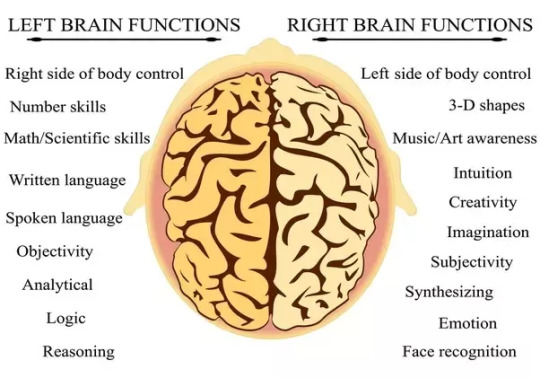
As shown by this highly scientific diagram, there is a general localization of specific cognitive and mental phenomena associated with each hemisphere and I hope that on some level that the mental action of enacting an input to the corresponding area of the brain that is more generally specialized in carrying out that processing might improve the effectiveness and/or efficiency of that given task. I would love to get an hold of an EEG and do some digging but that is a future project
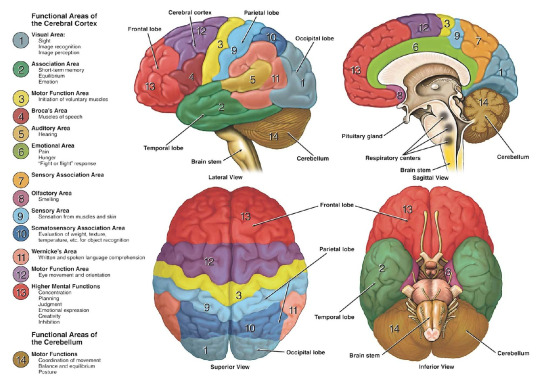
So aside from forcing 42 specific commands into your brain, let alone the time required to practice utilizing this mind map in vivo, there is unfortunately another set within the +y knowledge branch where each domain of knowledge has ten subsets in order to break down learning and assimilating new information into more discrete chunks in order to facilitate recall and synthetizing of a priori knowledge.
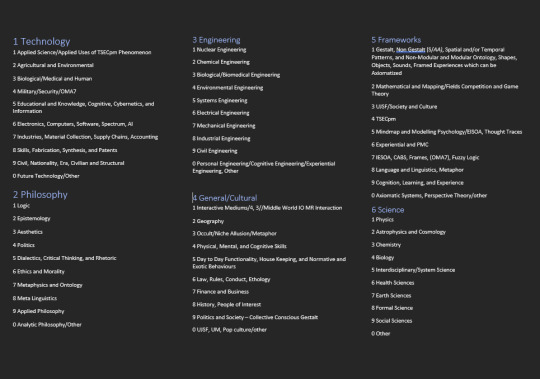
This is one module of many such systems I have developed to try to be able to reproducibly able to self actualize on a daily basis.
There is an ungodly amount of extra details and systems that I have curated, developed, and refined regarding the MM and some of them are evident in some of the seemingly occult acronyms scattered throughout this document.
I was going to create an ARG game for later on in this year of 2023 after I finished the Unsignificant Sentience trilogy and I was going to make mechanics such as this MM part of the way to play the ARG and to get players immersed in the world building but I just want to get some of my ideas out there as I have been working on too many projects in a vacuum
I am done screaming into the void
#neurodivergencies#life hacks#mind map#psychology#geek#writing#sherlockbbc#mind palace#unsignificant sentience#neuroscience#science#physics#a guide to disgusie#cybernetics#biology
120 notes
·
View notes
Note
Hey there! I was surprised that your OC Ivy is actually Indian as well! Can you tell me something more about her? :)
Hi! Thank you for your ask :))
I'm actually Indian too, so I totally wanted to make an Indian OC! I never really saw any until yours and I was pretty surprised too. I must say it gave me some motivation to make my own.
Anyway, here's Ivy! (I'm still figuring out her lore, so some of these MAY change in future lol)
About my COD OC, Ivy "Vampire" Valentina Salvador de Almeida
Basics
Ivy is the only daughter of Salvador and Helen de Almeida.
She was born in India, in the state of Goa, on the outskirts of Madgaon and lived there for a few years before moving down south to Karnataka, where she spent her formative years. Her teenage and adult years were spent in Liverpool, England.
She can speak Konkani and English fluently, while she has partial fluency in Portuguese and Kannada
She's a devout Roman Catholic
Her personality type is ENFJ
She's a tall girl standing at 5'7"/170 cm! Always stood at the back of the line for school assemblies. She inherited her height from her dad.
She's a WO2 Drill Sergeant in the British Army and serves in the Infantry Training Center where she trains infantrymen in basic and advanced skills.
She's nicknamed 'Vampire' from her slightly long canine teeth, all natural.
Personality
Being an extrovert, she enjoys company and doesn't like being alone.
She's normally quiet, but if she does speak, she's charismatic, genuine, and charming, and this often got her into quite some leadership positions in school and university, and allows her to very easily make friends.
Drinking makes her talkative, and even flirtatious, but she'll have to drink quite a lot to get to that point.
She has a strong sense of justice, and cannot stand it if innocent people are needlessly harmed. Being a drill sergeant gives her a little power to execute justice if needed.
She's optimistic to a fault, often getting bogged down by reality sometimes.
Her restless, adventurous spirit makes her hate being in one place. She enjoys travelling and doing highly thrilling activities like bungee jumping. She can also be quite reckless; give her a motorcycle and she'll be popping wheelies and even drifting.
Being an only-child, she can be quite selfish and bossy, though most of it was beaten out of her during her basic training.
Likes and Dislikes
She enjoys cooking and baking and can make a variety of dishes.
She loves reading historical accounts and all sorts of fiction, especially thrillers and mysteries. Her favourite novel is 'The Hound of the Baskervilles' by Sir Arthur Conan Doyle. She also enjoys Dostoevsky's novels
Her favourite Indian food is Mysore masala dosa and English food is Scotch egg
She hates milk tea and extremely spicy food (her Indian card is always at the risk of being revoked)
She loves anything that has garlic in it, though her favourite would be garlic bread
Her favourite dessert is apple pie
An area that has her whole heart is the Western Ghats
Her favourite color is phtahlo green
English Ivy
Her father is an adventurous man, so he took his family hopping around a lot from Goa to Karnataka, and eventually to England, where his wife got a job as a nurse.
Ivy and family moved to England when she was around fifteen years old, and settled in Liverpool.
Getting used to England's cold and gloom was a nightmare for poor coast born Ivy who loves the sun and heat. She can comfortably tolerate 30-35 degrees C like most Indians, but absolutely suffers through English winters despite eventually getting used to it.
Her years in Liverpool eventually bestowed upon her the glorious Scouse accent, though hers has an Indian lilt to it.
She had a hard time adjusting in English society, especially as an extrovert and a teenager, and often felt unwelcome in school. However, her university years were much more pleasant.
Do not talk to her about the Indian food in England. She will not hesitate to begin her TED talk.
If there's anything she actually does like about England, it's the abundance of pubs. She loves to drink, but considering how reckless she is known to be, she's surprisingly a responsible drinker and rarely lets herself get blackout drunk.
I've yet to think about her interactions with TF141, but that's all about her for now!
Wow, I really did infodump on you lmao. I hope it was an interesting read ^^ I'm excited to develop her some more and make more Ivy content <3
Thank you again for your ask! Have a great day/night :)
#aoioozora answers#ivy vampire salvador#call of duty#call of duty oc#call of duty original character#cod oc#cod ocs#cod original character
11 notes
·
View notes
Text
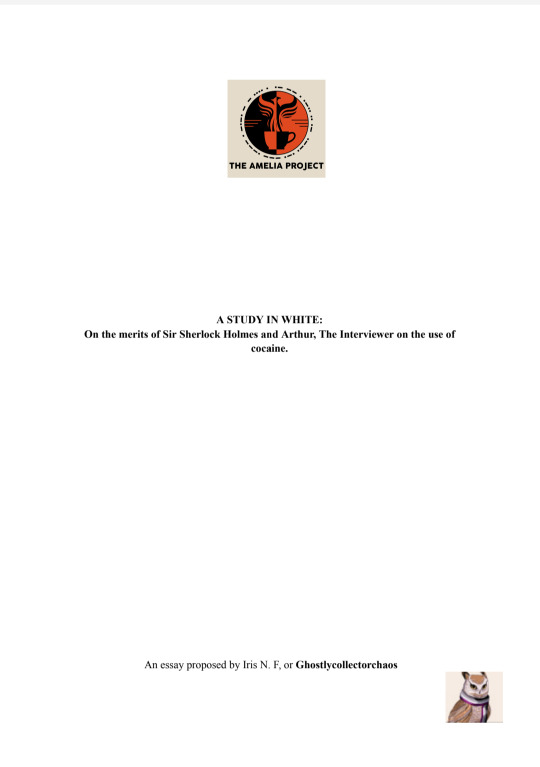
A Study In White:
The first wave of cocaine use occurred in the second half of the 19th century, between 1860 and 1905. This stimulant, which has the characteristic of causing a pleasant effect, evidenced by a feeling of well-being, euphoria and lack of shame, was greatly welcomed in the medical community as a miraculous panacea that could be used to solve various diseases and ailments, from toothache to labor contractions, as well as mental disorders such as “hysteria” or “melancholy”. One of the greatest enthusiasts of the therapeutic use of this substance was the Austrian physician Sigmund Freud who often prescribed this drug during consultations with his patients to resolve the most varied emotional or physical pathologies.
In this sense, when considering the close patient-physician relationship that was probably established between the latter and Mr. Sherlock Holmes during treatment for the absence seizures that he reported to be having due to malicious hypnosis techniques, it is possible to assume that cocaine was indicated by Dr. Freud to Mr. Holmes. Furthermore, if Sir Arthur Conan Doyle's transcripts are taken at face value, it is noteworthy that in the first book, which would give rise to the series of the detective's adventures, “A Study In Scarlet (1887)”, Mr. Holmes mentions taking regularly, 3x a day more specifically, the stimulant at 7% dilution intravenously. A high dosage, but not particularly shocking as the occasional use of the drug was common practice in Victorian England.
Reaffirming this fact, in “The Sign Of Four (1890)”, cocaine is referred to as a mind stimulant and nerve tonic during idle moments, being extremely useful for strengthening logical reasoning. It is thus clear why the use of the stimulant is so appealing to Holmes, since there are few other things he values in equal esteem as the power of his brain and the importance of keeping his wits sharp. In addition, if Freud had indeed prescribed the drug there would be even more reason for Holmes to use it religiously in order to avoid the relapse into the absence seizures that made him seek help from the Phoenix Brotherhood in the first place.
It is also noteworthy that Holmes did not consider himself an addict in the most common sense of the word, but maintained his chemical dependency as something to be managed. This sense of control over one's addiction, whether justified or not, will be a relevant point as this discussion moves towards its conclusion.
Now that the foundations of this essay have been laid on the character of one of those involved, it remains to discuss the other. Unfortunately, due to the specific quality of the fraternity of which it is said and I quote, "Amelia is all about secrets", there has been a difficulty in obtaining reliable data about the past life and believable personality of Arthur, the Interviewer and many of the claims that will be made here are based on speculation and empirical analysis. In order to avoid unnecessary bias when dealing with an individual who is already sufficiently obscure, two main sources were used: "The Amelia Project Wiki: The Interviewer" and "The Amelia Project Personality Database: The Interviewer".
Based on these, the following information was extracted:
“The Interviewer is a very jolly fellow. He is often enthusiastic and can be quite intense, especially when engaged in something of his liking. However, he is also very easily bored, and doesn't like to partake in things that's not interesting to him. While often friendly, he can come across as a bit arrogant, rude and self centered. He does care a lot about the people closest to him though, and often seems genuinely interested in helping other people, and of course to hear their stories.”
Furthermore, he fits as a 7w8 ENTP by the Myers-Brigg method, associated with the sanguine temperament described by Galen of Pergamum.
Although the ENTP 7w8 personality is seen as a particularly cheerful, outgoing, intellectual and quick-witted type who value creativity, freedom and self-expression above all else, these have as their main characteristics the impulsiveness that leads them to take unnecessary risks and accomplish poor planning in medium and long term consequence analysis. These individuals tend to be irresponsible, often putting themselves in dangerous situations, since the journey for “freedom and stimulation” can lead them to destinations that are sometimes easily avoidable.
In addition, the sanguine temperament only reinforces these traits. While they are generally communicative, expressive and cordial, they are also prone to emotional instability and indiscipline, often being exaggerated and unproductive in their decisions.
It is emphasized, of course, that the use of stimulating substances is related to several intrinsic and extrinsic factors to the individual, but several researchers such as the Institute of Addiction Medicine, in Philadelphia, USA, point out personality traits that are common in people with greater chance of developing chemical dependency, namely: Impulsivity, non-conformity, low stress tolerance, sensation seeking, etc.
It is possible to observe that Arthur, the Interviewer has most of these traits, having a personality that almost presents itself as a risk factor.
That, coupled with a close friend, Mr. Holmes, who makes prescribed use of the drug while denying the addictive quality of the substance, plus the fact that at the time there was no knowledge about the negative effects associated with its use, such as neural destruction, liver and kidney damage, mental illnesses, among other problems, corroborate the speculation that Arthur could have been exposed and even introduced to the stimulant during the period referring to the cohabitation between him and Mr. Holmes.
Furthermore, it is chronologically possible with what was exposed during the year 1929.
BIBLIOGRAPHIC REFERENCE:
Available at: <https://www.google.com/url?sa=t&source=web&rct=j&url=https://www.victorianweb.org/authors/ doyle/addiction.html&ved=2ahUKEwiHlLXfzL3_AhUurpUCHZ-FCNUQFnoECBEQAQ&usg=AOvVaw3P5rR8LLkdUh3gx32ln5Vj>. Accessed on: 13 June. 2023.
Available at: <https://www.google.com/url?sa=t&source=web&rct=j&url=https://www.gruporecanto.com.br/ blog/what-leads-a-person-to-use-drugs-understand-the-reasons/&ved=2ahUKEwiL16iGzb3_AhUSrJUCHZdIDR0QFnoECBAQAQ&usg=AOvVaw06pjH1omH5FVLgpi3PAlX8>. Accessed on: 13 June. 2023.
Available at: <https://www.personality-database.com/profile/602939/the-interviewer-the-amelia-project-mbti-personality-type> . Accessed on: 13 June. 2023.
The ENTP 7w8 : Characteristics, Weaknesses and Famous Characters - Introverted Growth. Available from: <https://introvertedgrowth.com/entp-7w8/>. Accessed on: 13 June. 2023.
@ameliapodcast though you would like the essay
26 notes
·
View notes
Text
This was one of the most well known true crime mysteries in Sir Arthur Conan Doyle's lifetime....
"Hauser appeared seemingly out of nowhere in what is now Nuremberg, Germany, on May 26, 1828, when he was about 16 years old. He was found wandering the town square with no identification and with an unsigned letter clutched in his hand.
The letter and Hauser’s fragmented recollections told a harrowing tale: that he grew up in a cramped dungeon that he never left and was fed and kept clean by a benefactor whom he never saw. When the teenage Hauser turned up in the town center, he could barely write his own name and was scarcely able to communicate with officials who questioned him."
Content warning for child abuse - Wikipedia Article
3 notes
·
View notes
Note
Oh, but if I may be so bold, I'd love to get some proper book recommendations by you, even without a tag game going on or anything. So if you feel like sharing.... I am always on the hunt for recs 👀🖤
I'd be happy to! Here are 8 books I really love:
The Valley of Fear by Sir Arthur Conan Doyle.
If you're following me there's a good chance you've already read this, but just in case you haven't, if I could recommend you read one story out of the Holmes canon, it would be this one. It is genuinely so clever and so well written with multiple gut-punch reveals, and the ending scene is genuinely haunting. I am devastated that there's never been a film adaptation (well not since the silent film era anyway), but that's all the more reason to give this one a read!
The Kingdoms by Natasha Pulley
This book was a birthday gift from @teledild0nix and it instantly became one of my all time favorites. I'd recommend going into the story knowing as little about it as possible so I can't give you a good summary, but if you like mysteries, time travel, or pirate stories with a touch of romance, I think you'll enjoy this one!
The Picture of Dorian Gray by Oscar Wilde
I think I mentioned in the retrospective that reading this book in high school was one of the first books I actually analyzed for myself. Since then, my appreciation for this book has only grown. It's exactly everything that appeals to me most: it's set in the Victorian era, it's got clever dialogue, it plays with the contrast between appearances and reality, and most importantly, it's ultimately a clever commentary on what it means to create something, how much of yourself (and your audience, and the expectations of society, and the views of critics, and and and) gets put into and influences the work, and the disastrous effects all of that can have. That theme being the center point of the story makes it even more tragic that this book ended up playing into Wilde's own downfall.
Also, no I will not stop trying to make BBC Dorian happen (and by that I mean mentioning how good a fit it would be for a Mofftiss adaptation at every chance I get)
The Tale of Despereax by Kate Dicamillo
A childhood favorite that has continued to have a tremendous influence on my approach to storytelling. The Tale of Despereax is the story of a mouse who wishes he was a knight, of a rat caught between a life in the darkness when he yearns for the light, and a little girl who is seen as more inconvenience than person because of the abuse she's suffered. Ultimately, it's about navigating the world when you want things you're told you shouldn't and the consequences rigid roles can have on all of us. The way the stories are woven together blew my mind when I was eight, and to this day I'm still so drawn to the comforting narration and the brilliant way Dicamillo made those complicated issues accessible for children.
Leaves of Grass by Walt Whitman
Full disclosure I haven’t actually made it all the way through this book, but whenever I come back to it and read the poetry it resonates with me in such a profound way. If you need something that will help you feel like life is beautiful and worth living, pick this one up and flip to a random poem.
Midnight Sun by Stephenie Meyer
Okay, listen. This book has all the same flaws as the rest of Stephenie Meyer's writing (in some cases far more egregious than other entries, I'm thinking specifically about the way she writes the Quileute Tribe here). If you can't get into it for those reasons, I totally get it. But as someone who spent my adolescence hoping this book would come out someday, it's better than I could have ever hoped for. There's a degree of self-awareness in this book, really leaning into the oddness of Edward Cullen's behavior and in light of the ways his decisions in this book really come around to bite him in later entries in the series, it kind of acts as a scalding critique of his worldview. Full disclosure part of the reason this one resonates with me so much is because I saw a lot of myself in Edward's constant and insufferable catastrophizing, and realizing that gave myself the ultimate tool to stop those thoughts in their tracks: "Rebekah, you're Edward Cullening again." Works like a charm.
A Tree Grows in Brooklyn by Betty Smith
Speaking of problematic favorites... This book was written in the 1950s about the 1910s and it completely shows in the way Smith writes about people who aren't christian or white (it's not outwardly hateful, in fact I think Smith thinks she's being very accepting, but some of the choices are very, very stereotyped and the more I revisit it as an adult the more uncomfortable these sections make me). So if someone can't get around that, I get it, I find it harder and harder to get around that myself.
What keeps drawing me back to this one is how vibrant and nostalgic and bittersweet and genuine the narration of Francie's life is. The story is told as a series of vignettes, beginning one Saturday afternoon when Francie is 12 years old, jumping back to the day her parents met, and then continuing forward chronologically until Francie is reaching adulthood. There's a wistfulness to everything that makes it clear a lot of this is based on Smith's own upbringing, but it's clearly a romanticized version of it, I think she described it as "the way it ought to have been," which given how grim parts of the novel are is saying something. I read this book every few years and if you go through it yourself, you'll probably notice how big of an influence it's had on my own worldview and writing.
And finally the big one:
How to Read Literature Like a Professor by Thomas. C. Foster
The book that literally changed my life, if you've ever felt unsure of how or where to begin understanding literary symbolism, this is the book I would recommend to get you started. The way Foster pulls from examples you'll already be familiar with, makes the conclusions seem logical rather than nebulous, and especially the way he describes the interconnectedness of storytelling all make literary analysis both accessible and even captivating. Like with A Tree Grows in Brooklyn, I think if you read this one, the influence it's had on me is going to be immediately obvious.
22 notes
·
View notes
Text
Books Aaron Has Read and Enjoyed [a ramble]


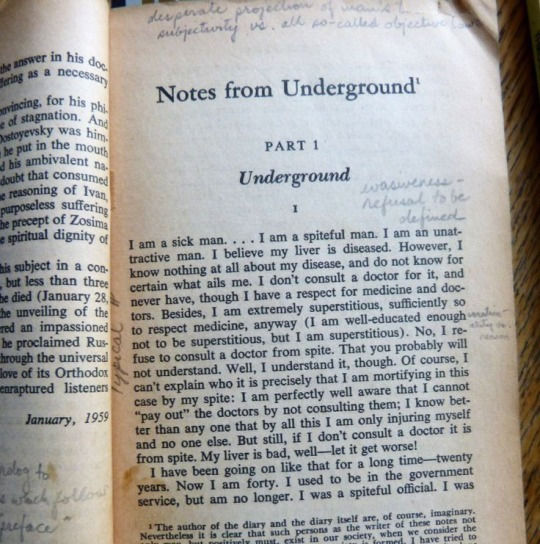
Photo credits: Left (mine) Center (@hotch-girl) Right (@lone-nyctophile)
So deep down I think Aaron loves to read. Not all the time, because there isn’t time for it often. But every now and then he’ll pick up a book for one reason or another. Because of this, I’ve compiled a list of six books that I think Aaron has read, why he read it, and what his favorite line of the book was and why. I think this list might prove Aaron is a romantic, even if he doesn’t think so. Enjoy all of that below the cut. Sending my love to you all this Saturday evening - Levi
The Poisonwood Bible by Barbra Kingsolver
When and why he read it - Aaron had to take an America Novel class his sophomore year.
Why he likes it - Aaron really wasn’t a fan of the book at the beginning. It was the longest book on the reading list, and even though he is a fast reader, he found it tedious at the beginning. However as the story progresses and he saw Mr. Price spiral out of control and eventually succumbs to his mania, Hotch feels a connection to the man and his own father. He felt a sick sort of satisfaction as Mr. Price was burned alive due to his madness. This is a book Aaron wouldn’t reread, but he remembers it well.
His favorite quote from the text - “Don’t try and make life a mathematics problem with yourself in the center and everything coming out equal. When you’re good, bad things can still happen. And if you’re bad, you can still get lucky” (Kingsolver).
King Lear by William Sheakspeare
When and why he read it - Aaron read this in high school when he was starting to fall in love with Hailey. He joined the theater club and went as far as reading King Lear because Hailey loved it and was writing a paper about it.
Why he likes it - He likes it because it brings him fond memories of Hailey and their very early relationship. He has reread the play a few times though he has no idea where his original copy is. He went looking through a few boxes in the attic once with no success.
His favorite quote from the text - “In jest, there is truth” (Shakespeare).
The Sound and the Fury by Willaim Faulkner
When and why he read it - This is one that Aaron picked up for himself. He’d been told it was a classic so many times, and he figured he would see what all the fuss was about. He read this over a quiet weekend when the team was having a break.
Why he likes it - Aaron enjoys the second and fourth sections the most. The stream-of-consciousness style in Quetinen Compson’s section was a nice change from the first. Aaron wouldn’t say it aloud, but it had been a challenging read for him. He shudders at the thought of reading something like Infinite Jest, another book that he had been told that he just must read in his lifetime.
His favorite quote from the text - “I give you mausoleums of all hope and desire… I give it to you not that you may remember time, but that you might forget it now and then for a moment and not spend all your breath trying to conquer it. Because no battle is ever won he said. They are not even fought. The field only reveals to man his own folly and despair, and victory is an illusion of philosophers and fools” (Faulkner).
The Complete Stories of Sherlock Holmes by Sir Arthur Conan Doyle
When and why he read it - During a few cases in the winter when Aaron felt that he wasn’t his sharpest, he had complained to Rossi about questioning his abilities to profile and lead the team. That Christmas Dave had given him this collection and a note on the inside read: “If you’re doubting yourself, why don’t you read about a real profiler?” The note had been a joke, but one day he decided, ‘What the hell? Let’s see how wrong Doyle got the science.’
Why he likes it - Aaron didn’t expect to like the character of Sherlock as much as he had. The Britishisms and Holmes's dry humor made him chuckle. The science was very wrong.
His favorite quote from the text - “As a rule, the more bizarre a thing is, the less mysterious it proves to be” (Sir Arthur Conan Doyle).
The Brothers Karimozov by Fyodor Dostoyevsky
When and why he read it - This was a gift for his forty-seventh birthday from you (the reader). It’s their favorite book, and they thought he might like the themes of family, atheism, and loss of faith.
Why he likes it - He found reading this both easier and more challenging than The Poisonwood Bible. He was much older, but the depth of the story and the ideas brought up challenged him to introspect in a way that he hadn’t in a long time. After he finished he felt a bit cathartic and he had to call you to give some thoughts.
His favorite quote from the text - “I believe like a child that suffering will be healed and made up for, that all the humiliating absurdity of human contradictions will vanish like a pitiful mirage, like the despicable fabrications of the impotent and infinitely small Euclidean mind of man, that in the world's finale, at the moment of eternal harmony, something so precious will come to pass that it will suffice for all hearts, for the comforting of all resentments, for the atonement of all the crimes of humanity, for all the blood that they’ve shed; that it will make it not only possible to forgive but to justified all that has happened” (Dostoyevsky). - Aaron isn’t sure if this is his favorite because he likes it, or because it’s your favorite line. When you tried to explain why, you cried, and he held you close. Aaron’s not sure he believes everything said here. He’s not sure he’s earned a spot for that type of bliss when he goes. But he wants it for you and for Jack and Hailey too. And for him, that’s good enough.
On Beautry by Zadie Smith
When and why he read it - This was a gift from Emily after her first month on the team. She was just so grateful that she was with the BAU. It felt like home to her.
Why he likes it - Aaron likes satire. The biting and witty phrases of Smith make him smile. He may not understand that it's a spoof of Howard’s End, but it doesn’t really matter for his understanding of the text. The last line, his favorite, also reminds him of Hailey and it makes him a bit sad, but not in a heartbreaking kind of way. More that there was hope. Hope for broken people, and he wanted to believe in that.
His favorite quote from the text - “Though her hands were imprecise blurs, paint heaped on paint and rolled with the brush, the rest of her skin had been expertly rendered in all its variety -- chalky whites, and lively pinks, the underlying blue of her veins and the ever-present human hint of yellow, imitations of what is to come” (Smith)
#criminal minds#ssa aaron hotchner#aaron hotcher#hotch#hotch drabble#hotch thoughts#criminal minds theory#Hotch likes to read#soft hotch#my thoughts#just thinking of aaron#literature#english literature#hotch reads#comfort character#book recommendations#aaron's reading list#hailey hotchner#emily prentiss#david rossi#hotch x reader
8 notes
·
View notes
Text
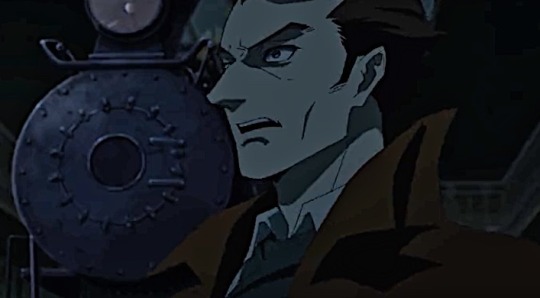
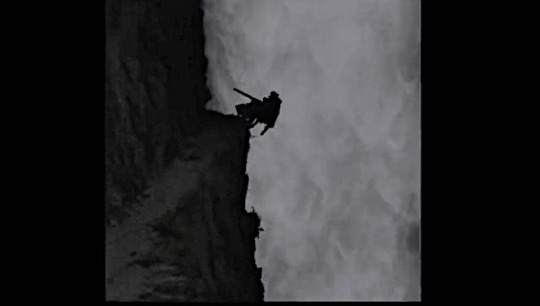
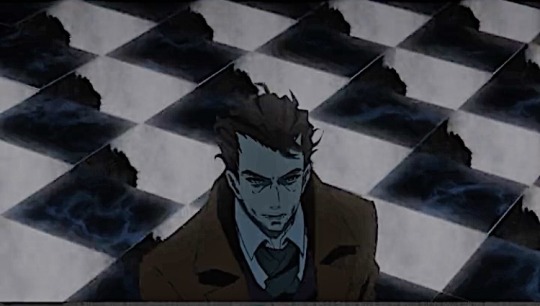
This series got me hooked without expecting anything. Because this is an all-star cast in the crime/thriller/horror genre in a classical sense getting mixed up with the Japanese folklore which makes this anime sympathetic and exciting to watch.
At this rate, everyone who has seen the series already guess that Professor M is, drumroll please!, James Moriarty.
He is the Napoleon of crime, Watson. He is the organizer of half that is evil and of nearly all that is undetected in this great city. He is a genius, a philosopher, an abstract thinker. He has a brain of the first order. He sits motionless, like a spider in the center of its web, but that web has a thousand radiations, and he knows well every quiver of each of them. He does little himself. He only plans. But his agents are numerous and splendidly organized. Is there a crime to be done, a paper to be abstracted, we will say, a house to be rifled, a man to be removed--the word is passed to the Professor, the matter is organized and carried out. The agent may be caught. In that case money is found for his bail or his defence. But the central power which uses the agent is never caught--never so much as suspected. This was the organization which I deduced, Watson, and which I devoted my whole energy to exposing and breaking up. (“The Final Problem,” Sir Arthur Conan Doyle)
By the 8th episode, Sherlock Holmes will have to face the Professor and it will be the Reichenbach all over again. And John Watson is forced to see his friend fall (again?) with the film reel the Professor has prepared. It wouldn’t be an SH tragedy without any form of Reichenbach Fall.
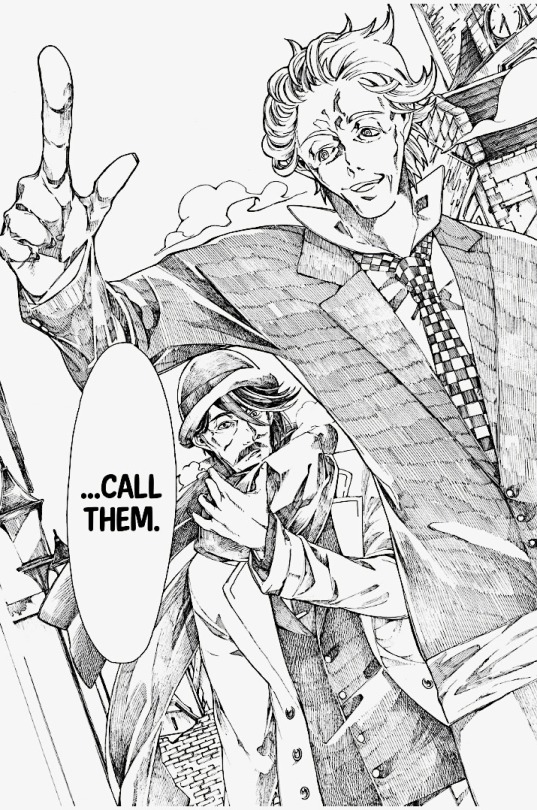
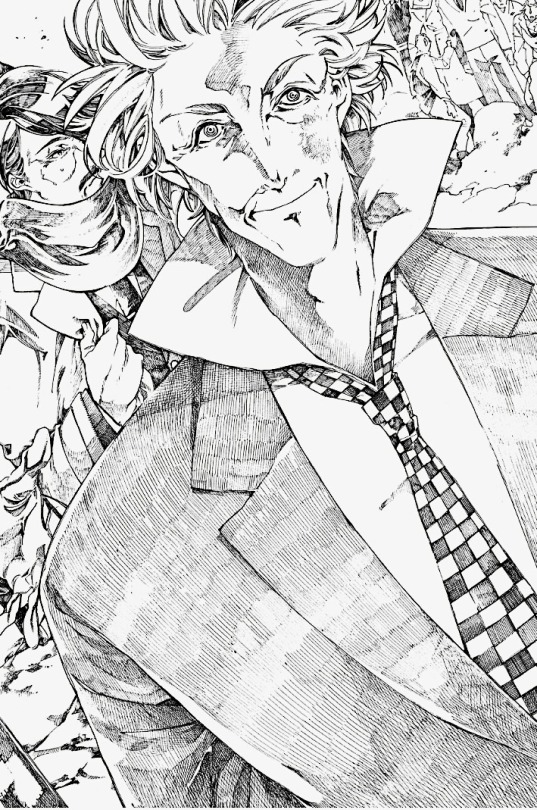
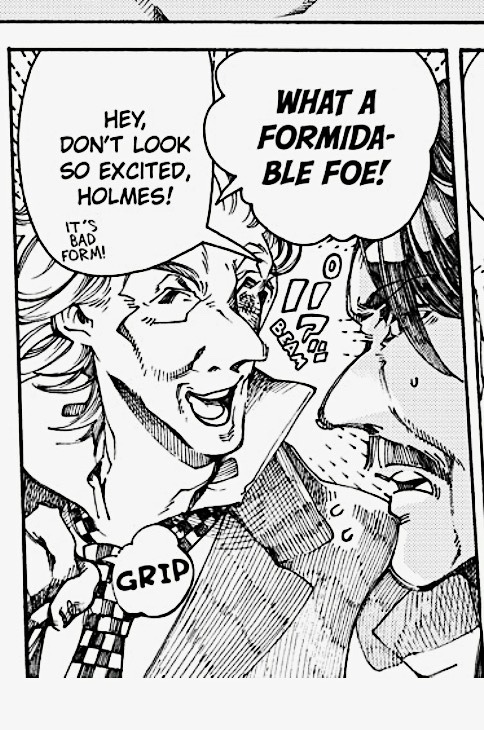
But I am thankful that they redesigned SH and JW for the anime. A JW with long fringes is well unique. SH, on the other hand, has an exaggerated aquiline nose.
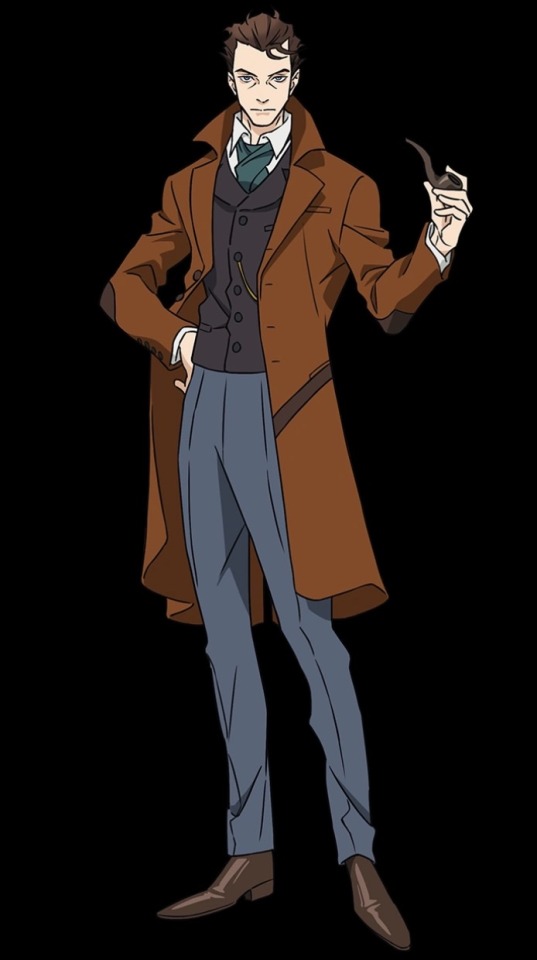
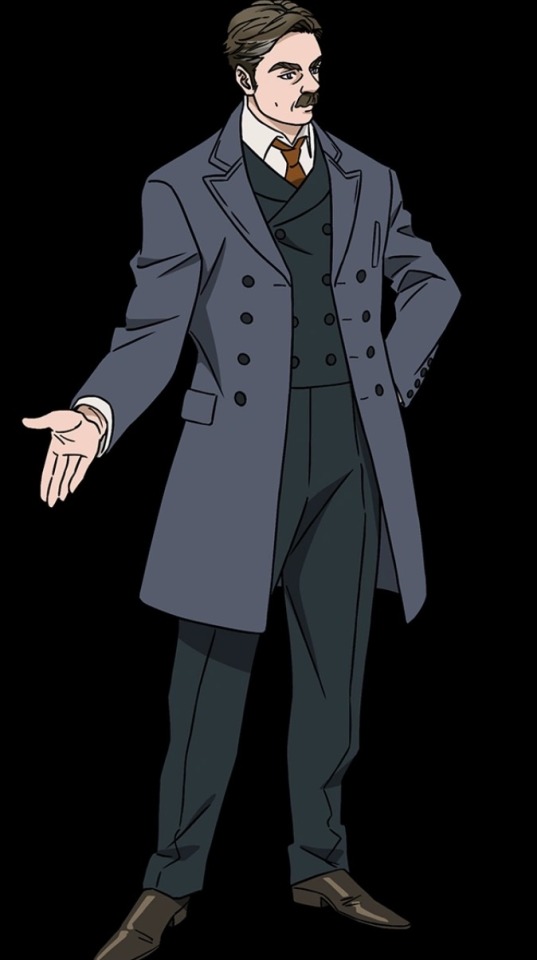
#undead girl murder farce#ugmf spoilers#sherlock holmes#john watson#yugo aosaki#professor moriarty#episode 8#ugmf speculation
11 notes
·
View notes
Text
Fic Ideas
So, since I’m stuck with writer’s block for the time being, I suppose now is as good as a time as any to relay the fic ideas I conjured up while trying to stay sane during my two week long academic bs.
Before I begin, I would like to clarify that all these fic ideas are about Mirai Nikki as well as that they all have names!
First off: Mirai Nikki: Titanomachy
This fic will be similar to MN, a survival game with 12 players, each equipped with a piece of technology that can predict the future. However, this is where it diverges from the source. Instead of the Roman pantheon, as the name suggests, the 12 players will be based on the 12 Titans of Greek mythology. Additionally, instead of a battle royale to become God, the players must use their diaries in order to survive their world as it slowly fluctuates from stable to unstable over time. Furthermore, their individual diaries can only predict a smaller window of the future as opposed to the original ones that gradually becomes larger as it progresses. This detail contains a massive spoiler that will be explained in the fic.
Second is: The Case-Book of Keigo Kurusu
Like the Sir. Arthur Conan Doyle work of a similar name, this fic has Keigo Kurusu star as a private investigator that gets commissioned by various citizens of Sakurami City with solving their cases. Nishijima is also there to act as Keigo’s assistant. Additionally, with inspiration of one of my mutual’s posts regarding Keigo, the general atmosphere of the fic has film noir tone.
Lastly, as anticlimactic it may be: More Than Meets the Sacred Eye
This fic, as stated in a previous post, centers around Tsubaki Kasugano as she attempts to have a normal, teenage girl life after her parents disbanded the Omekata Religion. However, her chance of normalcy will be threatened as she encounters supernatural entities in Sakurami CIty. Some having much closer ties to her than she realized. Will Tsubaki regain her chance of a normal life or will she succumb to the paranormal? Tune in if I ever come to writing the fic!
So, with all that is said and done, thank you for taking your time to listen to my ramblings and feel free to give your critiques of my ideas!
#fic ideas#mirai nikki#future diary#do i tag the characters?#eh fuck it#keigo kurusu#masumi nishijima#tsubaki kasugano
15 notes
·
View notes
Text
TAYLOR READS 2023: A STUDY IN SCARLET BY SIR ARTHUR CONAN DOYLE
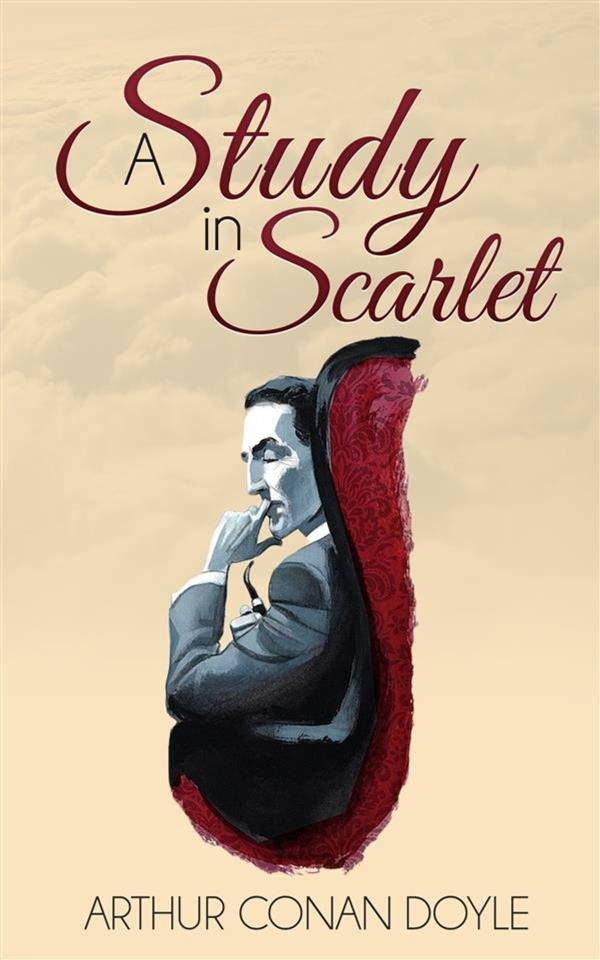
Title: A Study in Scarlet (1887)
Author: Sir Arthur Conan Doyle
Genre/Tags: Fiction, Mystery, Murder Mystery, Western, First-Person, Third-Person
Rating: 6/10
Date Began: 01/28/2023
Date Finished: 03/04/2023
Returning from war in the Middle East, Dr. Watson finds himself in search of a roommate in London. He makes the acquaintance of a man named Sherlock Holmes, an eccentric private detective with a bold new approach to investigating crime. The duo soon find themselves at the center of a bizarre murder; a corpse with no visible wounds in an abandoned house, and the word “RACHE” written on the wall in someone else’s blood. Through his keen deductive reasoning, Holmes begins to unravel the mystery surrounding the murder— but not before a second body is found, and the culprit’s complicated past takes center stage.
There is no satisfaction in vengeance unless the offender has time to realize who it is that strikes him, and why retribution has come upon him.
For live reading notes, check the reblogs (warning for spoilers of... a book published in 1887).
Content warnings and review (spoiler-free and spoiler versions) under the cut.
Content Warnings: Depicted — Self-harm, drug use, death, murder, animal death, stalking/harassment, terrorism, misogyny, racism, forced marriage, terminal illness.
Mentioned — Warfare, traumatic injury, colonialism, sexual harassment, sexual slavery/kidnapping, suicide.
**SPOILER FREE REVIEW**
Some disclaimers before I jump into the review. This is the first Sherlock Holmes story I’ve read, and my exposure to it in pop culture boils down to (1) about a season of Elementary and (2) the Guy Ritchie movies, of all things. Thankfully I avoided the terrible BBC show during its peak hype, so it didn’t sour me on the whole concept. While I know some of the unavoidable tropes, the stories themselves are mostly unknown to me. Second, A Study in Scarlet is actually the first Sherlock Holmes story ever published. This was a coincidence; I have a couple books I picked up at a second-hand store and grabbed this one at random. Part of me wishes I’d started with a later book, but oh well.
The first half of A Study in Scarlet, which is the bulk of the murder mystery, is an entertaining read. I genuinely enjoyed thinking over the evidence and trying to piece together the mystery, a central appeal to Sherlock Holmes. There’s a revenge narrative toward the end, and while it’s no Count of Monte Cristo, I did enjoy the themes and observations about human nature this introduced to the story. Doyle’s prose is serviceable, and there’s several lines and descriptions that really stuck out to me. A Study in Scarlet is an early work, so I’m interested to see how he develops as a writer in the later stories.
Characterization is hit or miss. Holmes is solid. Much of A Study in Scarlet is told from Watson’s perspective, and he meets Holmes for the first time in this story. As a result, both characters feel multidimensional; we get Watson’s honest impressions of Holmes (good and bad), and as a result learn about Watson’s own personality and opinions. The culprit, when revealed, is well-developed for Spoiler Reasons. Beyond that, I found the rest of the cast forgettable. Not every character needs to be deep and nuanced, but some really needed more development, or even a noteworthy trait. I didn’t get that from most.
There are some small details that made me laugh, like Holmes saying he wants his name to be famous. Mission accomplished, buddy. He creates what’s basically luminol in his introductory scene, in a book published decades before it was invented. As someone who mostly reads speculative fiction, I see this kind of thing in scifi, but to see it in a murder mystery is a fun surprise.
Obviously being written in 1887, there’s some aspects of the story that didn’t age well. Mostly this shows in racism, colonialism, and related terminology. This isn’t a huge surprise coming from a British author in the late 19th century. For what it’s worth, there’s one footnote in this entire story, which Doyle uses to make a snarky comment about sexism. So I guess he gets a brownie point there?
Overall, the book is okay, but not amazing. I have some major criticisms of the story, but they mostly fall into the spoiler section of the review.
**SPOILER REVIEW**
So, the mystery. I was under the impression, before reading this, that Sherlock Holmes stories are fair mysteries, aka it’s possible for the reader to figure everything out on their own based on the clues provided in the story. Unfortunately A Study in Scarlet is only partially fair; you can glean the means of the crime, but not the perpetrator or their motive. During the grand reveal at the end of the story, we learn Holmes had access to information that the reader did not, and that’s how he figured out who committed the two murders. This honestly soured the whole thing for me. It might seem like a small thing, but the problem-solving aspect is what I was looking forward to most with these stories, so knowing I never had a chance makes it feel a little pointless.
My second major issue with A Study in Scarlet is its structure. The story is split into two parts. The first half is pretty much what one would expect— Holmes and Watson meet in London for the first time, we learn a little about their characters, a mysterious murder happens, and we follow the cast around as more clues present themselves. This was by far the strongest part of the story for me. So it was a little jarring when Holmes apprehends the murderer at the end of Part One, with an entire half of the novel to go.
The story then jumps back in time by around thirty years, in the United States, following a new set of characters. From here the story switches from a murder mystery to what I can only describe as a thriller Western. I guess Doyle really wanted to write a Western? Or maybe dunk on Mormonism for a while (fair enough)? To be clear, I love narrative shifts, genre muddling, and time jumps, the more experimental the better, but they have to be done well. This one is not; it feels out of place with Part One, and what it accomplishes narratively could have been done better in other ways.
It’s pretty clear from the start that Part Two exists to establish back-story for Jefferson Hope (the culprit) and why he killed Drebber and Stangerson. But Doyle spends way too long on two characters— Hope’s love interest Lucy and her adoptive father Ferrier— who only exist to get killed off. Despite them being the “focus” for several chapters, their development and personality are lacking, mostly told to the reader instead of demonstrated. “Show, don’t tell” is obviously not a hard rule, but it was much needed in this case. It takes a long time for Hope to enter this part of the story, which is a problem if he’s the protagonist. I admit it’s pretty wild to have actual real Mormons be the antagonists of a freaking Sherlock Holmes story, but other than the novelty and historical context, I didn’t find them to be compelling villains.
Maybe this leap into the past would work better if integrated into the main mystery story, or if it was pared down substantially, or even if the whole thing was told from Hope’s perspective. When Hope describes how he committed the murders toward the end, we do get his perspective… and it’s great! It made me wish all of Part Two had been told in this matter; it’s way more fascinating than what we got.
In all, A Study in Scarlet wasn’t bad, just mediocre. Had it not been attached to the most iconic character in Western canon, I doubt it would still be published and read today. But I’m sure future entries refine and improve upon the formula; I can cut a lot of slack considering this was Doyle’s first attempt at a Holmes story, and they’ve withstood the test of time for a reason. I plan to read a few later stories in the series to see how they compare to this first entry.
11 notes
·
View notes
Note
your opinion on dunk&egg adaptation? it's a good story but i don't think it will draw attention, only those who are really fans of the universe know what the story is, the general audience doesn't... and what does the general public like to see? dragons! D&E doesn't have any, my theory... they're going to adapt aegon's conquest because it has dragons and all that shit and whether or not dragons sell and its is what grabs attention and what the audience wants to see so..and at the same time D&E because that way one will pull the other, its a win for both sides, i don't know this makes sense 😭😅
Yeah ...
Dunk & Egg is my favorite GRRM writings.
I like it better than ASoIaF and The Dance - though I'm attached to the characters in "The Dance" much more ... especially Alicent, Criston, and Daeron. But I'm a sucker for short stories and Novellas. I'm a big Robert E. Howard and Sir Arthur Conan Doyle guy. And the short but descriptive writing and Character driven narratives of Dunk & Egg really speaks to me more than any of Martin's other works.
I'm not so sure how popular it would be either, cause Dunk and Egg isn't a traditional fantasy. There's not fantastical creatures or even overt magic. It's more of a slice of life Medieval adventure about small problems. But I actually love that kind of stuff.
I'm a Comic Book guy - more DC than Marvel - and my favorite runs on Batman are from writers like Denny O'Neil and Paul Dini whose Batman stories weren't these cataclysmic epics where Gotham was in danger. They were mostly Detective stories centered around Batman solving complex mysteries that had no repercussions on the status Quo. And that's what I love about Dunk and Egg. Their adventures aren't changing anything big in the scheme of things, they're just existing in the world, helping people, or stumbling onto plots on a very local level.
So, I'm pretty excited for the show. Plus, it'll be pretty cheap to make, I think. At least no more expensive than any other period drama that BBC or ITV put out on the regular over in Britain.
I highly recommend "A Knight of the Seven Kingdoms" Audiobook with Harry Lloyd. He does such a fantastic job doing the voices and crafting a cadence and distinct character for every one in it. It and he are so good.
#A Knight of the Seven Kingdoms#The Hedge Knight#Dunk and Egg#Harry Lloyd#Ser Duncan the Tall#Aegon V Targaryen
9 notes
·
View notes
Note
Sorry, what’s 3GAR?
3GAR is “The Adventure of the Three Garridebs”, originally published in October of 1924 in Collier’s Weekly and written by Sir Arthur Conan Doyle and as is probably obvious from all it’s about Sherlock Holmes lmao
it’s at the tail end of the stories so if you’re reading them in publication order you’ve been through four novels (A Study in Scarlet, The Sign of Four, The Hound of the Baskervilles, The Valley of Fear) and four complete collections of short stories (The Adventures of Sherlock Holmes, The Memoirs of Sherlock Holmes, The Return of Sherlock Holmes, His Last Bow) as well as the first few entries in the very last one, The Case-Book of Sherlock Holmes
and in every one of these there’s been this tension, there’s been this incredible understanding between Holmes and Watson that they’re the centers upon which each others’ worlds turn, and nothing’s ever come of it, not once
and then Watson gets shot
and Holmes informs the man responsible that if it had been a lethal shot he wouldn’t be going out of that room alive, and Watson has a sexual awakening about it
27 notes
·
View notes
Text
And the fields of philosophy, anthropology, and psychology are just the beginning. We could easily go on for dozens, for hundreds, of pages demonstrating how these questions lay at the very center of Western intellectual and cultural life.
We could trace their pathways through numerous Nobel scientists, with physicists showing a particular fondness for the subject. We could then chart a similar lineage through major modern artists, including painters like Piet Mondrian and Wassily Kandinsky. The latter’s The Spiritual in Art, for example, is clearly indebted to the “Thought Forms” of Theosophy and the philosophy of Rudolf Steiner.
And this is before we even get to modern literature, with authors like Edgar Allan Poe, Margaret Fuller, Sir Edward Bulwer-Lytton, Victor Hugo, Jules Verne, Mark Twain, Arthur Conan Doyle, Lewis Carroll, W. B. Yeats, Henry Miller, Philip K. Dick, Arthur C. Clarke, Stephen King, and Michael Crichton all writing explicitly about their spiritualist, psychical, paranormal, and occult interests and experiences.
Such occult experiences were hardly tangential to such authors. They were integral components of the creative process. Hence Bruce Mills has recently written about the mesmeric and magnetic currents that played such an important role in the creation of a distinctly American literature in the middle of the nineteenth century, and Alex Owen has written about “the symbiotic relationship among vitalism, occultism, and advanced literary ideas” in turn-of-the-century Britain.
The accomplished occultist W. B. Yeats, whose magical name was Demon Est Deus Inversus or “The Devil is God in Reverse” (they just called him “Demon”), might have been an extreme case, but he was hardly alone when he confessed to John O’Leary in a letter that the “mystical life is the centre of all that I do and all that I think and all that I write.”
-- Jeffrey J. Kripal, Authors of the Impossible: The Paranormal and the Sacred
7 notes
·
View notes
Text
Bert Coules A Scandal in Bohemia transcript
Hello! I’ve long been aware that there’s no readily available transcripts of the Bert Coules/Clive Merrison Sherlock Holmes radio shows. To remedy this, I am working (slowly) on some transcripts myself.
Below the cut is my full transcription of the first episode, A Scandal in Bohemia. Please let me know if there are any errors/anything missing that I should include! I’m not a professional, just someone trying to make these shows a little more accessible, since I really do love them. Enjoy!
THE ADVENTURES OF SHERLOCK HOLMES
A Scandal in Bohemia
Radioplay by Bert Coules
(Transcribed by Plato)
[EPISODE BEGINS]
[A slap]
IRENE ADLER: Ow!
FIRST BURGLAR: Where is it?
[IRENE ADLER sobs and breathes heavily]
Where is it? I’m losing my patience with you, lady!
[The sound of ripping, a struggle]
Ow! You whoring--!
SECOND BURGLAR: That’s enough! This isn’t going to work. Let her go.
FIRST BURGLAR: Let me cut her up a bit.
SECOND BURGLAR: No! You heard the orders. Besides, look at that face. You wouldn’t want to ruin its market value.
[He spits and laughs]
Superb. Let her go.
[Violin introduction plays]
ANNOUNCER: A Scandal in Bohemia by Sir Arthur Conan Doyle. Dramatised for radio by Bert Coules. With Clive Merrison as Sherlock Holmes and Michael Williams as Dr. John Watson. And featuring Sarah Biddell as Irene Adler, and Andrew Sachs as the King.
A Scandal in Bohemia.
[Violin introduction finishes]
JOHN WATSON [V/O]: To Sherlock Holmes, she is always the woman. I have seldom heard him mention her under any other name. In his eyes, she eclipses and predominates the whole of her sex. It was not that he felt anything akin to love for her; all emotions (and that one particularly) were abhorrent to his precise analytical mind.
SHERLOCK HOLMES [with disgust]: Love! Love is an emotional thing, and whatever is emotional is opposed to true, cold reason.
JOHN WATSON: Which you place above everything else!
HOLMES: Of course! I should never marry myself-
WATSON: Ha! I’d like to see the woman who’d take you on.
HOLMES: -Lest I bias my judgment.
WATSON: I trust that my judgment may survive the ordeal!
HOLMES: Agh.
WATSON [V/O]: And yet to him, there was one woman. And that woman was the beautiful Irene Adler, of dubious and questionable memory.
[IRENE ADLER’s voice, singing German opera with piano accompaniment.]
I had seen little of Holmes lately. My marriage had drifted us away from each other. My own complete happiness, and the home-centered interests which rise up around the man who first finds himself master of his own establishment, were sufficient to absorb my attention. While Holmes, who loathed every form of society with his whole Bohemian soul, remained alone in our old lodgings. Buried among his books and his chemicals, and alternating, so I presume, between cocaine and ambition. The drowsiness of the drug and the fierce energy of his own nature. Beyond the occasional vague accounts of his activities, which I shared with all the readers of the daily press, I knew nothing of my former friend.
Then, one night when my journey home from a patient led me through Baker Street, and I passed the well-remembered door, I was seized with a keen desire to see him again.
[The opening of a door and the ringing of the bell. WATSON sputters with cold. The door closes]
WATSON: Good evening, Mrs. Hudson! [He startles.] Oh, why, I do beg your pardon.
MRS. TURNER: Good evening, sir. My name is Turner. May I help you?
WATSON: Well, uh, is Mr. Sherlock Holmes in?
TURNER: He is, sir. Do you have an appointment?
WATSON: An appointment? No, no I don’t.
TURNER: I’ll ask if Mr. Holmes will see you. What name shall I say?
MRS. HUDSON: Dr. Watson!
WATSON: Mrs. Hudson! It’s good to see you again.
TURNER: Martha, you shouldn’t be on your feet.
HUDSON: Nonsense, Alice. Come in, Doctor, come in.
WATSON: Thank you very much.
[He steps inside]
TURNER: Now, Martha, you go and rest.
HUDSON: Stop fussing ‘round me, Alice, I’m perfectly alright.
TURNER: Just as you like. I’ll be in the kitchen if I’m wanted.
[She leaves and shuts the door behind her]
WATSON: Mrs. Hudson, who on earth was that?
HUDSON: Oh, you mustn’t mind her, Doctor, she’s my cousin, Alice Turner. She’s been. . . giving me a hand.
WATSON: Have you been ill?
HUDSON: Oh, I’m fine now. She’ll be off home in a day or two, and neither she nor Mr. Holmes will be shedding a tear about it if I’m any judge. Now let me look at you.
Doctor, you’re a real sight for sore eyes. And how’s Mrs. Watson?
WATSON: She’s very well, thank you. Mrs. Hudson, you shouldn’t let him wear you into the ground. Why didn’t you send for me?
HUDSON: Now, sir, you have your own life to lead. And a good woman to be thinking of. I’ll announce you.
WATSON: No-no-no-no, you stay down here and get some rest. Do you, uh, do you think he’ll be pleased to see me?
HUDSON: Of course he will! Up you go, now.
[HOLMES plays the violin.]
[There is a knocking at the door. HOLMES sighs.]
HOLMES: Yes? What is it? Come in, Mrs. Turner.
[The door opens and WATSON enters]
WATSON: Good evening, Holmes.
HOLMES: Watson.
WATSON: I was. . . Passing the door.
HOLMES: Pray, come in.
WATSON: Thank you. [He shuts the door] Phew! It’s a cold night.
HOLMES: Wedlock suits you. You’ve put on seven and a half pounds since I saw you last.
WATSON: Seven.
HOLMES: Just a trifle more, I fancy.
WATSON: Perhaps.
HOLMES: You are back in practice, but your list is not yet a long one. Tonight, you called on a patient in a prosperous household to which you traveled by four-wheeler. You got yourself very wet lately, and you have a most clumsy and careless servant-girl. Would you care for a whisky?
[WATSON laughs and HOLMES joins in.]
WATSON: My dear fellow, how are you?
HOLMES: Oh, I’ve been kept busy.
WATSON: I’m delighted to hear it.
HOLMES: Now take- take off your coat, Watson. Have a seat.
[WATSON and HOLMES both groan and sigh as WATSON removes his coat and sits down.]
WATSON: Thank you.
HOLMES: Now, you’ll join me in a drink?
WATSON: That would be very welcome.
HOLMES: How is Mrs. Watson?
WATSON: Oh! She’s in excellent spirits.
HOLMES: Ah, splendid, splendid. Ah, ah, here we are. . . [he hands WATSON a drink]
WATSON: Thank you. To your very good health.
HOLMES: And yours.
WATSON: Mary is just about to give notice to our servant-girl, though how you could tell that she was so bad is beyond me. You know, if you’d have lived a few centuries ago, you would certainly have been burned.
HOLMES: That would have been a tragedy. Then the world would have been denied your colourful exercises in romantic fiction.
WATSON: Oho, you mean those reprehensible little efforts that have made your name and brought you so much work?
[HOLMES attempts to interrupt]
Now, no, no, don’t waste your time thinking up another sarcastic answer. Just tell me how you knew about Mary Jane.
HOLMES: By the inner side of your left shoe.
WATSON [sighing]: Go on.
[HOLMES cackles and claps]
HOLMES: Hm! The leather is scored by six parallel cuts where someone has very carelessly scraped mud from the edge of the sole-mud so long-neglected it has completely crusted. Hence, my double deduction: that you had been out in vile weather, and that you had a particularly malignant, boot-slitting specimen of the London slavey.
WATSON [chuckling]: Ridiculously simple.
HOLMES: Well, then I won’t insult your intelligence by explaining the rest.
[A rustle of paper; a letter being handed over.]
Have a look at this—it came by the last post.
WATSON: Pink paper. No address, no date, no signature. [reading] “There will call upon you to-night at a quarter to eight o’clock a gentleman-“ Holmes, that’s in about five minutes!
HOLMES: Read on.
WATSON [reading]: “-a gentleman who desires to consult you upon a matter of the very deepest moment. Your recent services to [with incredulity] one of the royal houses of Europe-“
HOLMES: Holland.
WATSON [reading]: “-have shown that you are one who may safely be trusted with matters which are of an importance which can hardly be exaggerated.” Mm, Holmes!
HOLMES: Bah! [He takes the letter and reads] “This account of you we have from all quarters received. Be in your chamber at that hour.”
WATSON: What do you imagine it means?
HOLMES: Now, Watson, how many times? It is a capital mistake to theorise before one has data. But we have the note itself. What do you deduce from it?
WATSON: Eh, it’s a man’s writing, and he’s well-to-do. Paper like this couldn’t be bought under half a crown a packet. It’s peculiarly strong and stiff.
HOLMES: Peculiar is the very word. It’s not an English paper. Hold it up to the light.
WATSON: Ah, yes, there’s a watermark. “EGPGT”. A paper company’s monogram? German?
HOLMES: Very good. Egria Papier Gesellschaft.
WATSON: Egria?
HOLMES: Eh, in Bohemia. And the writer of the note is a German-speaker, eh?
WATSON: Hm? Ah! “This account of you we have from all quarters received.”
HOLMES: Only a German is so uncourteous to his verbs.
[WATSON chuckles.]
HOLMES: A-ha!
WATSON: What is it?
HOLMES: Teutonic punctuality. I believe I heard. . . [he moves the curtain] Yes, a nice little brougham, and a pair of beauties, a hundred and fifty guineas apiece, easily. There’s money in this case, if there’s nothing else. And there is our man!
WATSON: What’s he like?
HOLMES: Six foot six, built like Hercules, appallingly overdressed, and exhibiting an intense desire for anonymity.
WATSON: Anonymity?
HOLMES: He’s wearing a mask.
WATSON: A mask, for goodness’ sake?
[The bell rings]
Ah, I’d better go.
HOLMES: Not a bit, doctor. Stay where you are.
WATSON: Yeah, but- but your client!
HOLMES: Never mind him, you’ll find a notebook and a pencil on my desk. If you’ve no objection.
WATSON [with feeling]: My dear fellow.
HOLMES: I am lost without my Boswell.
WATSON: Thank you, Holmes.
[A sturdy knock at the door.]
HOLMES: Well, whoever he is, he’s survived Mrs. Turner. Come in!
[The door opens and KING WILHELM GOTTSREICH SIGISMOND VON ORMSTEIN enters]
KING WILHELM: You had my note. I told you that I would call.
HOLMES: You did. Pray, take a seat.
KING WILHELM: Who is this person?
HOLMES: This is my friend and colleague, Dr. Watson. Whom have I the honor to address?
KING WILHELM: You may address me as the Count von Kramm, a Bohemian nobleman. I should much prefer to communicate with you alone.
WATSON: I should leave.
HOLMES: No, Doctor! It is both or none, Count; you may say before this gentleman anything which you may say to me.
KING WILHELM: Very well. [He sits] You will excuse this mask. The august person who employs me wishes his agent to be unknown to you, and I may confess that the title by which I have just called myself is not exactly my own.
HOLMES: I was aware of it.
KING WILHELM: The circumstances are of great delicacy, and could grow into an immense scandal. It is not too much to say that the whole course of European history could be affected. To speak plainly, the matter implicates the great house of Ormstein, Kings of Bohemia.
HOLMES [yawning]: I was also aware of that.
KING WILHELM: Sir! You were represented to me as the most energetic agent and most incisive reasoner in Europe!
HOLMES: Your informer was not in error.
KING WILHELM: This is intolerable!
HOLMES: If you would condescend to state your case, I should be better able to advise Your Majesty.
WATSON: Your Majesty?
[KING WILHELM sputters and stands.]
KING WILHELM: [He sighs] You are right. I am the King. [He scoffs]. Why should I attempt to conceal it?
HOLMES: Why indeed? Your Majesty had not spoken before I was aware that I was addressing Wilhelm Gottsreich Sigismond von Ormstein, Grand Duke of Cassel-Felstein, and hereditary King of Bohemia. Do, please sit down.
[KING WILHELM sits.]
HOLMES: Thank you. Now, Doctor, if you please?
WATSON: Certainly.
KING WILHELM: What are you doing?
WATSON: I’m taking notes. Confidential notes.
KING WILHELM: Very well. The facts are briefly these: some five years ago, when I was still only Crown Prince, I made the acquaintance of the well-known adventuress Irene Adler. The- the name is no doubt familiar to you?
HOLMES: Irene Adler. Look her up in my index, Doctor.
WATSON: Yes. [He rustles through the books] Adler, Adler. . . Ah: Adler, Irene. She’s a singer, born in New Jersey in ’58. Here.
[WATSON passes the book to HOLMES]
HOLMES: Thank you. Contralto, hm. La Scala, hm! Imperial Opera of Warsaw, yes, retired from the operatic stage two years ago at the age of only twenty-eight, now lives in London, once celebrated throughout Europe as. . . as an adventuress. Quite so. Your Majesty, as I understand, became entangled with this. . . person.
KING WILHELM: Entangled. . . yes. Yes, that is exactly the word.
[Flashback-the sound of IRENE ADLER laughing and the beat of horses’ hooves at a canter.]
IRENE ADLER: That’s three races in a row, Willy! What’s the matter with you?
KING WILHELM: The next time I buy you a horse, I’ll do the choosing! The slowest one I can find.
IRENE ADLER: You just don’t like being outridden by a woman.
KING WILHELM: Or perhaps I’ll give you something less exhausting.
IRENE ADLER: A yacht? I’ve always wanted a yacht.
KING WILHELM: What would you do with a yacht?
IRENE ADLER: Willy, there are things you can do on a yacht that you can’t do on a horse.
[KING WILHELM laughs]
Come on!
[The horses’ hooves pick up again.]
KING WILHELM: Ah, she was beautiful, elegant, clever. She was the most refreshing, the most natural woman I’ve ever encountered. And the most audacious.
IRENE ADLER [flashback]: Ready, Willy? Here I come.
KING WILHELM [somewhat incredulous]: Irene.
IRENE ADLER: Don’t you like the suit? It’s one of my favorites.
KING WILHELM: It’s- is this some kind of a joke? What have you done to yourself?
IRENE ADLER: I thought we’d go for a stroll. These are my walking clothes.
KING WILHELM: You expect me to appear in public with you looking like that? For God’s sake, woman, what will people say?
IRENE ADLER: Is that all you ever think about? Listen, my love, once I fix my hair I can fool anyone.
KING WILHELM: You’re not serious.
IRENE ADLER: I’m perfectly serious. Now shut up and kiss me.
Well? What are you waiting for?
KING WILHELM: I want to remember this moment. [he chuckles.] I never kissed a man before.
[They kiss.]
HOLMES: And Your Majesty wrote this singular young lady some compromising letters, and is now desirous of getting those letters back?
KING WILHELM: But how could you possibly know that? I’m not exaggerating when I say that if certain individuals suspected that I even so much as spoke to that woman, the effects would be calamitous.
HOLMES: Was there a secret marriage?
KING WILHELM: No, none.
HOLMES: No legal papers or certificates?
KING WILHELM: None.
HOLMES: Then I fail to follow, Your Majesty. If she should produce her letters, how is she to prove their authenticity?
KING WILHELM: There’s the writing.
HOLMES: Oh, but forgery!
KING WILHELM: My private notepaper!
WATSON: Stolen.
KING WILHELM: My own seal!
HOLMES: Imitated.
KING WILHELM: She has my photograph!
WATSON: Bought.
KING WILHELM: We were both in the photograph.
HOLMES: Oh dear, that is very bad. Your Majesty has indeed committed an indiscretion.
KING WILHELM: I was mad- insane! The photograph is. . . is particularly compromising.
[HOLMES laughs]
This is a highly serious matter!
HOLMES [still laughing]: But certainly. You have placed yourself in a difficult position.
KING WILHELM: That photograph must be recovered. I have tried and failed. Burglars in my employ have ransacked her house! Her luggage has been diverted when she traveled, twice she has been waylaid!
WATSON: Waylaid?
KING WILHELM: There has been no result.
HOLMES: You must pay; it must be bought.
KING WILHELM: She will not sell.
HOLMES: Indeed? Then if blackmail is not the lady’s aim. . .
KING WILHELM: She proposes to ruin me.
HOLMES: How?
KING WILHELM: I am about to be married.
HOLMES: So I have heard.
KING WILHELM: To Clotilde Lothman von Saxe-Meningen, second daughter of the King of Scandinavia.
WATSON: A family of strict principles.
KING WILHELM: The strictest! The princess herself is the very soul of delicacy. A shadow of doubt as to my conduct would bring the matter to an end. That must not be allowed to happen!
HOLMES: And Irene Adler. . .
KING WILHELM: Threatens to send them the photograph, and she will do it. I know that she will do it! She has a soul of steel. She has the face of the most beautiful of women, and the mind of the most resolute of men.
WATSON: You’re sure that she hasn’t sent it already?
KING WILHELM: Yes, I’m sure. She has said that she would send it on the day that the betrothal is publicly announced. That would be next Monday.
HOLMES: Oh, we have three days! That is very fortunate. I do have one or two matters of importance to look into just at the present. Your Majesty has not told us everything.
KING WILHELM: What do you mean?
HOLMES: Why will she do this thing? Why does she wish to see you ruined?
KING WILHELM: You ask the obvious. She fell hopelessly in love with me. Rather than see me marry another woman, there are no lengths to which she would not go.
HOLMES: Rather than see you marry another woman?
KING WILHELM [sputtering]: Somehow, somehow she gained the impression that. . .
WATSON [incredulous]: You proposed marriage to her?
KING WILHELM: It was a joke, a fantasy, how could she not see that?
HOLMES: Your Majesty will, of course, stay in London for the present.
KING WILHELM: You will find me at the Langham Hotel. As the Count von Kramm.
HOLMES: Of course. As to money. . .
KING WILHELM: I would give one of the provinces of my kingdom to regain that photograph.
WATSON: Good Lord.
HOLMES: And for present expenses?
KING WILHELM: This bag contains three hundred pounds in gold and seven hundred in notes. I do not require a receipt.
HOLMES: And mademoiselle’s address?
KING WILHELM: St. John’s Wood. Here are the details.
[He hands over a piece of paper.]
Do not fail me.
[He shuts the door behind him. HOLMES and WATSON both exhale.]
WATSON: Holmes?
HOLMES: A charming gentleman. I’m not sure that I do not approve of the lady’s intentions.
WATSON: You’re defending her? A woman of that sort?
HOLMES: Watson, I’m interested in her motives, not her morals.
WATSON: Well then, you’d willingly see her create an international scandal?
HOLMES: It’s possible that she has no intention of doing anything of the sort. She’s certainly intelligent enough to know that the threat of exposure can be infinitely worse than the actuality.
WATSON: How can you possibly know that?
HOLMES: To live a successful life outside the conventional boundaries of society requires intelligence as well as bravery.
WATSON: If you feel that way, why did you accept the case?
HOLMES: Because a man who’s already tried burglary, theft, and violence is only a small step from something more drastic.
WATSON: You can’t mean that. A reigning monarch?
HOLMES: Powerful interests are at work here, Watson. I believe I can resolve the situation with a minimum of fuss.
WATSON: Assuming you manage to recover the photograph.
HOLMES [offended]: Oh, really, Doctor!
[HOLMES begins to scrape at his violin]
And now- good night to you.
WATSON: Oh. Good night.
HOLMES: Would you care to call tomorrow afternoon at three?
WATSON: With pleasure. Thank you. [He opens the door.]
HOLMES: Excellent. I should value a chat with you then.
WATSON: Till tomorrow, then.
Eh. . . Holmes? It was good to see you again. Goodnight.
HOLMES: Goodnight.
[He leaves and shuts the door.]
[A violin interlude plays.]
[The sound of a horse walking in harness, snorting.]
COACHMAN [shushing the horse]: Easy, boy! Hold him, would you mate?
HOLMES [affecting an accent similar to the COACHMAN’s] Yeah, easy there. That’s better. Good boy, good boy. Yeah.
COACHMAN: You got away right enough, why’d you lose your last place? The drink, was it?
HOLMES: Yeah.
COACHMAN: Yeah, I thought so. Just have to look at you. Bloody fool, you are. It’s not worth it.
HOLMES: I know.
COACHMAN: Oh, I do. I’ve been off it two years now. See where I am.
HOLMES: Good post, is it? Good mistress?
COACHMAN: Never had better. Treats me like I’m somebody, know what I mean? Hey, chuck over the blanket.
HOLMES: ‘Ere.
[There is a rustle of a horse’s blanket being moved.]
COACHMAN: Thanks.
HOLMES: No chance of somethin’ here, I suppose? Bit of a casual. . .?
COACHMAN: Yeah, give me a hand for a bit. I’ll see you all right for a bit.
[A woman approaches, singing.]
Hang on.
HOLMES: What?
COACHMAN: Listen.
[The woman’s voice gets louder.]
That’s her. Nice, eh?
HOLMES: Yeah. Nice.
[The scene changes to Baker Street. HOLMES is removing his disguise.]
WATSON: I had to look three times before I was sure it was you. One of your best.
HOLMES [still affecting the accent]: Oh, thank you, Doctor. I’m afraid your opinion isn’t shared by the fearsome Mrs. Turner.
WATSON: She saw you? Done up like that?
HOLMES [no longer affecting the accent]: In the hall, when I came in. It took me five minutes to convince her that I wasn’t a burglar, and as soon as I had succeeded she announced her intention of “leaving this madhouse, never to return.”
[WATSON laughs.]
WATSON: Holmes, you’re outrageous.
HOLMES: Thank you.
WATSON: I take it you’ve been out to Irene Adler’s house.
HOLMES: Exactly. It’s a bijou villa, two stories, with stables at the side and a secluded avenue. Chubb locks on the doors and window-fasteners that a child could open.
WATSON: Did you find anything else?
HOLMES: Oh yes. There’s a wonderful Freemasonry among horsey men. Be one of them, and soon you’ll know all there is to know. [He winces] In return for two hours of fetching and carrying, I received tuppence, two fills of shag tobacco, and as much information as I could desire.
WATSON: And?
HOLMES: She’s turned all the men’s heads down in that part, and she’s spoken of with considerable respect. She lives quietly, drives out at five each day, and returns at seven sharp. She has only one male visitor, but a good deal of him.
WATSON: Just a moment. [He takes out his notebook] Right. Go on.
HOLMES: Mr. Godfrey Norton, dark, handsome, and dashing. Never calls less than once a day, and often twice. He’s a lawyer.
WATSON: A lawyer. Is she his client? And if she is, what are they planning?
HOLMES: Exactly. Or is she his mistress? That was the next question to be answered.
WATSON: “Was”? You’ve answered it, then?
[HOLMES laughs}
I take it that’s a yes.
HOLMES: After I’d exhausted my friend in the mews, I went ‘round to the front of the house and lounged. Halfway through my first pipeful, things began to happen.
[Flashback, the sound of horses trotting.]
GODFREY NORTON: Wait there, cabbie!
CABBIE: Sir.
HOLMES [V/O]: It was Norton himself, exactly as he’d been described to me. He pushed past the maid with the air of a man who is thoroughly at home.
NORTON: Get your mistress’ carriage, hurry, girl!
HOLMES [V/O}: The maid rushed ‘round the corner to the mews, and I could see Norton through the windows of the sitting-room, pacing up and down and waving his arms. I was concerned about being so obvious an observer, but he ran straight past me when he emerged, and I doubt even registered my presence.
NORTON: The church of St. Monica in the Edgeware Road. Half a guinea if you do it in twenty minutes.
CABBIE: Right you are, sir! Up there!
[Horse’s hooves as the cab starts off.]
HOLMES [V/O]: Before Norton’s cab had turned the corner, up drove my friend the coachman on a neat little landau, and before I could even think about concealing myself, Irene Adler had swept past me and climbed in.
WATSON: You saw her? What’s she like?
IRENE ADLER: The church of St. Monica, John, we must reach there before twelve.
COACHMAN: Ma’am. Up there!
[Horse’s hooves as his cab goes too.]
WATSON: Holmes? What is she like?
HOLMES: She is a lovely woman, Watson. With a face a man might die for.
WATSON: Face a man might die. . . [he swallows] What did you do?
HOLMES: I was just balancing whether I should run for it or whether I should perch on the back of her landau when a cab came from the street. The driver looked twice at such a shabby fare, but I jumped in before he could object. We drove like the devil, but the others were there before us.
PRIEST: Forgive me, sir, but you must allow me to know my business. I tell you that it would not be valid.
NORTON: But it’s well before twelve! What’s your objection?
PRIEST: That is not the only requirement the Lord demands! I’m sorry, but we simply cannot proceed!
HOLMES [V/O]: I lounged up the side aisle, keeping in the shadows. I would have sworn that they had no idea I was there, but she spun ‘round and looked straight at me.
IRENE ADLER: Godfrey, over there.
NORTON: What? Oh, yes. Uh, you!
HOLMES [affecting the accent]: Uh- me, guv’nor?
NORTON: Eh, yes, you, come here!
HOLMES: Oh, well, I dunno. . .
NORTON: Oh, come on! Move, man!
[HOLMES walks up, dragging his feet.]
HOLMES: Yes, guv’nor? Missus?
NORTON: Just stand there quietly, please. Well, man?
PRIEST: Splendid. Dearly beloved, we are gathered here today in the sight of God. . . [his voice quiets and becomes background noise.]
HOLMES [V/O]: Before I knew where I was, I was holding a ring and generally assisting in the secure tying-up of Irene Adler, spinster, to Godfrey Norton, bachelor. It was the most preposterous position I’ve ever found myself in. I was standing as close to her as I am to you. Closer.
WATSON: Did she suspect you?
HOLMES: I do not believe so. After the ceremony, we exchanged a few words.
WATSON: What! Holmes?
HOLMES: There was no avoiding it!
PRIEST: Congratulations to you both.
NORTON: Thank you very much.
IRENE ADLER: Yes, thank you.
NORTON: Come along then, Mrs. Norton.
[IRENE ADLER chuckles]
IRENE ADLER: Oh, just one moment, Godfrey.
Sir? Please.
HOLMES [affecting his accent]: Me, missus?
IRENE ADLER: Please, come here.
HOLMES: Ma’am?
IRENE ADLER: I wanted to thank you. For being there when we needed you.
HOLMES: Oh, it’s my pleasure, ma’am.
IRENE ADLER: I think you were a lucky omen for our future. It was fate that brought you into the church.
HOLMES: I, uh, I don’t believe in fate, missus.
IRENE ADLER: Oh, my friend. Don’t you have any romance in you at all?
HOLMES: Um. . . I best be off, ma’am.
IRENE ADLER: Wait! Here.
HOLMES: No, missus. I’m not a beggar.
IRENE ADLER: To please me.
HOLMES: I’m obliged, then, ma’am. Good luck to you.
IRENE ADLER: And to you, my friend.
WATSON [in the present]: What did she give you?
HOLMES: A sovereign! Here. I mean to wear it on my watch-chain in memory of the occasion.
WATSON: Hm. A very unexpected turn of affairs.
HOLMES: There was still one more surprise to come. After being in such a palpable rush to get married, bride and groom proceeded to go their separate ways! He, back to the inn at Temple and she to her home. She even plans to take her usual evening drive! I heard her say so. It’s as if they wanted to keep the whole thing a secret.
WATSON: If you were right about the King’s intentions, and they’ve somehow got wind of them, it could be that she feels safer as Norton’s wife than as his mistress. Or was it no more than a sudden whim? Did she strike you as a creature of impulse?
Holmes?
HOLMES: We must act quickly. I need your cooperation this evening.
WATSON: I should be delighted.
HOLMES: You will require stealth, nerve, and accuracy.
WATSON: Accuracy?
HOLMES: Yes. One more thing: I trust you’ve no objection to breaking the law?
[A violin interlude plays.]
[Horse’s hooves.]
HOLMES [affecting an old man’s voice]: It’s good of you to accompany me, young man. It’s rare nowadays to encounter such courtesy. I fear you may find my conversation a little limited.
WATSON: Please, Holmes. Leave it until we’re there.
HOLMES [in his own voice]: Having second thoughts, Watson?
WATSON: I suppose you do know that impersonating a minister of the church is a criminal offence?
HOLMES: Yes, well, so is throwing a smoke rocket through somebody’s front window, and you’ve already agreed to that.
WATSON: Look, are you really sure that the photograph is somewhere in the house?
HOLMES: I don’t believe she’d entrust it to somebody else.
WATSON: But the King had the house burgled!
HOLMES: Pah! They didn’t know how to look.
WATSON: How will you look?
HOLMES: I will not look.
WATSON: Well then?
HOLMES: I’ll get her to show me.
[The sound of voices yelling, arguing.]
WATSON: Holmes, this is not what I would call a quiet avenue.
BEGGAR: Look, spare a coin, sir? Spare a coin for an old soldier?
HOLMES [affecting the old man’s voice]: Oh, you poor soul! Give him something, Doctor.
WATSON: Here you are, my man.
BEGGAR: Oh, God bless you, sir. And you too, Father.
HOLMES: Ah, here comes the landau. Good luck, Watson.
WATSON: And you.
BEGGAR: Here she comes!
[Horse’s hooves approaching]
BEGGAR: Let me open the door for you, lady!
[A cacophony of voices, arguing over who was there to help IRENE ADLER first.]
IRENE ADLER: What’s going on? Get away from my carriage!
[The voices escalate]
John?
BEGGAR : Clear off out of here, you heard the lady!
IRENE ADLER: John!
HOLMES [affecting his old man’s voice]: Stop it! Stop it at once! This is common brawling. Madam, I shall escort you to the door. Pray, take my arm.
SECOND BEGGAR: Get lost, you old fool!
[The sound of glass breaking, and HOLMES cries out in pain.]
Oh my god. . .
COACHMAN: You drunken idiot! Stand back there, give him some air!
IRENE ADLER: John? Is the gentleman all right?
COACHMAN: He’s still breathing. Come on, get out of here! Clear off!
IRENE ADLER: Well, we can’t leave him lying here. Help bring him into the house.
[Inside the house]
Sir? Sir, can you hear me?
[HOLMES moans deliriously.]
Let me look at those cuts. Turn your head this way.
HOLMES: No, no. . . Madam, I beg you. It’s nothing.
IRENE ADLER: But you’re bleeding.
HOLMES: A scratch. B-but madam, you? Were you injured?
IRENE ADLER: Quite unscathed, I assure you.
HOLMES: Oh, thank the Lord. They were roughs, madam. They meant to have your purse.
IRENE ADLER: Well, they did not succeed. Thanks to you, my friend.
HOLMES: Well, we live in evil times. I do not understand it, this mad desire to do harm to others! It will destroy our civilization.
IRENE ADLER: Not while there is goodness and love in the world, and brave gentlemen who think of others before themselves.
HOLMES: Oh, and gracious ladies. Amen to that, madam. Amen to that.
[He gasps for air.]
IRENE ADLER: Oh no, my dear sir-
[She pours HOLMES a glass of water.]
Here. Come, lift your head, let me help you. Take a sip of this. Slowly, now.
HOLMES: I, I cannot breathe!
IRENE ADLER: I’ll give you some air.
[She slides open the window while HOLMES pants.]
Oh, do not try to stand!
[There is a clatter- the smoke bomb has been thrown into the window. It fizzes.]
IRENE ADLER: What on earth?
HOLMES: Fire! Fire, madam! They’re burning the house! Save yourself!
IRENE ADLER: But- but this is ridiculous!
[Voices outside, all screaming ‘fire!’]
HOLMES: Save yourself, madam!
IRENE ADLER: Don’t alarm yourself, my friend! This is just some sort of stupid prank. I’ll ring for someone.
[She rings the bell.]
HOLMES: Oh, madam, I implore you! Your life is in peril!
[They both cough.]
IRENE ADLER: You are right. We must get out. Wait, I’ll help you. Just one moment.
[She slides open a compartment.]
HOLMES: Ah, it’s a false alarm!
IRENE ADLER: What?
[She closes the compartment.]
What did you say?
HOLMES: You were quite right. Look, madam, in the corner, there’s some sort of smoke device, nothing more!
[Voices outside, still screaming ‘fire!’]
You must tell them, they will summon the engine!
IRENE ADLER: Will they indeed? [shouting out the window] There is no fire! It was a false alarm!
HOLMES [in the present, in his own voice]: Congratulations, Watson! A first-rate job.
Doctor?
WATSON: Holmes, I don’t think I’ve ever felt more heartily ashamed of myself.
HOLMES: My dear fellow?
WATSON: When I saw that beautiful creature, and the way she treated you.
HOLMES: I thought you objected to her morals, Watson.
WATSON: Damn it, Holmes, she’s a kind and graceful woman! And we were conspiring against her.
HOLMES: Yes. Lay aside your scruples, Doctor, a job is a job. And it worked perfectly!
WATSON: You have the photograph?
HOLMES: I know where it is, hidden behind a sliding panel, just above the right bell-pull.
WATSON: And how did you find out?
HOLMES: She showed me, as I told you she would. When a woman thinks that her house is on fire, her instinct is at once to rush to the thing that she values most. It’s an overpowering impulse, and I’ve taken advantage of it several times. A married woman grabs at her baby; an unmarried one reaches for her jewel-box.
WATSON: And you reasoned that she had nothing in her house more precious to her than that photograph?
HOLMES: Exactly. And I was correct.
WATSON: Well, why didn’t you secure it then and there?
HOLMES: It was too risky. If we’re over-hasty, it may well ruin everything. Now, let’s see if we can’t find a cab. I believe we’ve earned our dinner. You realized of course that everyone in the street was an accomplice?
WATSON: Only after you’d given me the shock of my life. I really did think you’d been killed.
HOLMES: Oh, Watson!
WATSON: Ah, I mean! What would I have said to the King?
[They laugh into the distance.]
WATSON: There you are, driver.
CAB DRIVER: Thank you, sir. Walk on!
HOLMES: Our quest is practically finished. I shall call back there tomorrow with the King.
WATSON: With the King?
HOLMES: Yes. And you, if you’d care to come.
WATSON: Thank you.
HOLMES: It’s a well-run household. We shall be shown into the sitting-room to await the lady, but I think it probable that when she comes she may find neither us nor the photograph.
WATSON: Holmes? [in a whisper] Are you aware that we are being observed?
HOLMES: Observed?
WATSON: Mm. The young man in the ulster. A few doors down.
HOLMES: Oh yes. He’s coming this way.
Are you sure that Mrs. Watson isn’t expecting you back tonight?
WATSON: Quite sure! She knows you too well.
IRENE ADLER [disguised]: Goodnight, Mr. Sherlock Holmes.
WATSON: Holmes? Someone you know?
{A violin interlude plays.]
[The rumble of carriage-wheels and hooves.]
KING WILHELM: You are sure that we can get the photograph?
HOLMES: I have hopes.
KING WILHELM: Hopes? In your wire you said it was certain.
HOLMES: Irene Adler is married.
KING WILHELM: Married?
HOLMES: Yesterday. To an English lawyer named Norton.
KING WILHELM: Pah! She cannot love him.
HOLMES: Whyever not?
KING WILHELM: Because she’s still hopelessly infatuated with me! Why else does she pursue me so?
[The carriage-wheels stop.]
MAID: Ah, Mr. Sherlock Holmes, I believe?
HOLMES: I am Mr. Holmes.
MAID: Indeed. My mistress told me you were likely to call. She left this morning with her husband for the Continent.
WATSON: She has left England?
KING WILHELM: All is lost!
HOLMES: We shall see!
MAID: Sir, really!
HOLMES: Ah, now. . .
[he opens the compartment.]
Ah.
KING WILHELM: There is a photograph?
HOLMES: Here.
KING WILHELM: This is not the one!
HOLMES: What?
WATSON: Holmes, this is a photograph of the lady by herself!
HOLMES: So I observe. But this may explain matters.
KING WILHELM: Eh, if you please.
HOLMES: It is addressed to me.
KING WILHELM: To you?
HOLMES: Yes, to me.
[he opens the letter.]
[reading] “My Dear Mr. Sherlock Holmes, you really did it very well. You took me in completely. Until after the alarm of fire, I had not a suspicion. But then, when I found how I’d betrayed myself, I began to think. Yet even after I became suspicious, I found it hard to think evil of such a dear, kind old gentleman as that clergyman. But you know I-“
KING WILHELM: What is this nonsense? What of the photograph?
HOLMES: Watson?
WATSON: Hm. [reading] “But you know I have been trained as an actress myself. Male costume is nothing new to me, and I often take advantage of the freedom which it gives. Last night I followed my mysterious visitor to his door, and so discovered just who it was who had taken such an interest in me.”
HOLMES: “Goodnight, Mr. Sherlock Holmes.”
WATSON [reading]: “As to the photograph-“
KING WILHELM: At last! What does she say?
WATSON [reading]: “As to the photograph, your client may rest in peace.”
KING WILHELM: Oh, thank God!
WATSON [reading]: “The King may do what he will without hinderance from one whom he has cruelly wronged. I love, and am loved, by a better man than he. I leave a rather different photograph, which he may care to possess.”
KING WILHELM: What a woman! Ah, what a woman!
WATSON: Yes, indeed. Holmes?
HOLMES: Thank you.
IRENE ADLER [V/O]: Mr. Holmes, I know that you will understand that I keep the photograph only to safeguard myself against any steps which the King might take in the future. You will find the nest empty when you call, as I am sure you shall, tomorrow morning. You, sir, are a formidable antagonist. I remain, dear Mr. Sherlock Holmes, very truly yours. Irene Norton, nee Adler.”
HOLMES: I am sorry that I have not been able to bring Your Majesty’s business to a more successful conclusion.
KING WILHELM: On the contrary, my dear sir, nothing could be more successful. I know that her word is inviolate. The photograph is now as safe as if it were on the fire.
HOLMES: I am glad to hear Your Majesty say so.
KING WILHELM: Pray, tell me how I can reward you! This ring?
HOLMES: Your Majesty has something which I should value even more highly.
KING WILHELM: You have but to name it.
HOLMES: This photograph.
KING WILHELM [scoffing]: Irene’s photograph? Well, certainly, if you wish it.
HOLMES: I thank Your Majesty. Then there is no more to be done in the matter?
KING WILHELM: Ah, but what a woman. Did I not tell you how quick and resolute she was? Would she not have made an admirable queen, eh? Is it not a pity she was not on my level?
HOLMES: From what I have seen of the lady, she seems indeed to be on a very different level to Your Majesty. I have the honor to wish you a very good morning.
KING WILHELM: Ah, a remarkable individual. I would have permitted him to shake my hand.
WATSON: Good day, Your Majesty.
[They leave, and a violin interlude plays.]
WATSON [V/O]: And that was how a great scandal threatened the Kingdom of Bohemia, and how the best plans of Mr. Sherlock Holmes were beaten by a woman’s wit. He used to make merry if ever I mentioned the cleverness of women, but I have not heard him do it of late. And when he speaks of Irene Adler, or when he refers to her photograph, it is always under the honorable title of the woman.
[Violin outro plays]
ANNOUNCER: In A Scandal in Bohemia, Sherlock Holmes was played by Clive Merrison, and Dr. Watson by Michael Williams. Irene Adler was played by Sarah Biddell, and the King of Bohemia by Andrew Sachs. With Mary Allen as Mrs. Hudson, Jenny How as Mrs. Turner, Brian Miller as Norton, Danny Schiller as the priest, and Ian Lindsay as John. Other parts were played by members of the cast. The violinist was Leonard Freedman.
A Scandal in Bohemia was dramatised for radio by Bert Coules, and directed by Patrick Raynor.
[Violin outro finishes.]
[EPISODE ENDS]
#sherlock holmes#bert coules#clive merrison#sherlock holmes radioplays#bert coules radioplays#michael williams#uh#transcripts
12 notes
·
View notes